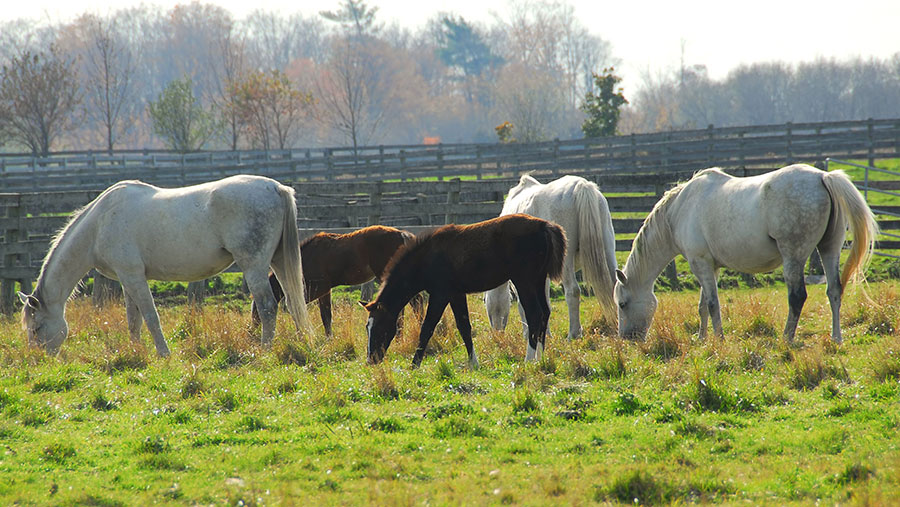Business Clinic: Can I remove horses from my land?
 © Monkey Business Images/REX/Shutterstock
© Monkey Business Images/REX/Shutterstock Whether you have a legal, tax, insurance, management or land issue, Farmers Weekly’s Business Clinic experts can help. Here, Russell Reeves offers advice about moving fly grazing horses from your land.
Q A traveller’s horses are grazing on my land without permission. I want to get them off because I need to plough the land. What can I do and can I move them to a pen, at least temporarily?
A This is quite a common situation for farmers to find themselves in. Thankfully the law has recently got up to speed, with the introduction of the Control of Horses Act 2015 giving greater power to farmers to remove horses being grazed on their land without permission and enabling them to resume farming.
There are, however, a number of risks that farmers need to understand and consider before taking steps to ‘reclaim’ the land.
See also: Business Clinic: Baler supplied was not as sold – what are my options?
Although farmers do not own the horses, they are already potentially liable for their welfare because the horses are on their land and therefore they may be considered to be ‘in charge’ of the animals.
 Russell Reeves
Russell Reeves Partner, Thrings
The difficulty is that the more action farmers take to look after the horses (such as temporarily moving them to a pen or feeding them), the greater the likelihood that the farmer will be seen to be in charge of the horses’ welfare.
If a farmer is in charge of the horses’ welfare, this brings about their potential liability under animal welfare law. Offences that often result in prosecution fall under sections 4 and 9 of the Animal Welfare Act 2006.
Section 4 states it is an offence to cause unnecessary suffering to an animal by something the owner of the land does or fails to do. Section 9, meanwhile, is a bit more specific: it provides that the landowner must take reasonable steps to ensure that the needs of the horses are met.
This includes: having access to a suitable environment; a suitable diet; an ability to exhibit normal behaviour patterns; a need to be housed with, or apart from, other animals; and protection from pain, suffering, injury and disease.
If a farmer moves the horses to a pen – even only temporarily – this may be in the horses’ best interest. Equally, however, it may not be (vets’ opinions may differ on this issue depending on the needs of the horses).
What matters to the farmer is the need to avoid the risk of being liable for the horses’ welfare. Steps farmers can take include:
- If the horses have only just arrived on the farmer’s land, they should inform Trading Standards and the police and follow any guidance provided by Trading Standards or, more likely, a Defra-appointed vet. This way the farmer will be seen to be co-operating from the outset.
- If the horses have been on the farmer’s land for a longer period of time, and the farmer has known about this (or ought to have known), they should seek advice from a specialist solicitor. This is because there is a greater risk that the farmer could be deemed ‘in control’ of the horses.
- Under the Control of Horses Act 2015, farmers have a new right to detain and remove the horses. Detention can occur for up to 24 hours. They should inform the police and the owner of the horses about this detention.
- The owner then has up to 96 hours to claim the horses and must pay the farmer for any damages they have caused. This includes the reimbursement for any reasonable expenses, such as feed or the cost of establishing the identity of the owner.
- If, after 96 hours (excluding Saturdays and Sundays) from the time the horses were detained, the owner has not claimed the horse, the farmer acquires ownership of the horses and can dispose of them by selling them or arranging for them to be destroyed. During this period of detainment, it is important the farmer remembers that their animal welfare responsibilities apply.
- An alternative approach would be for the farmer to issue court proceedings to obtain a court injunction against the owner of the horses, asking that he or she removes them. This way would allow the farmer to seek damages and, potentially, legal costs. The owner’s ability to pay should be considered beforehand.
This is a complex situation, and it is recommended that you seek specialist independent legal advice to assess your situation.
Do you have a question for the panel?

Outline your legal, tax, finance, insurance or farm management question in no more than 350 words and Farmers Weekly will put it to a member of the panel. Please give as much information as possible.
Send your enquiry to Business Clinic, Farmers Weekly, RBI, Quadrant House, The Quadrant, Sutton, Surrey SM2 5AS.
You can also email your question to fwbusinessclinic@rbi.co.uk
